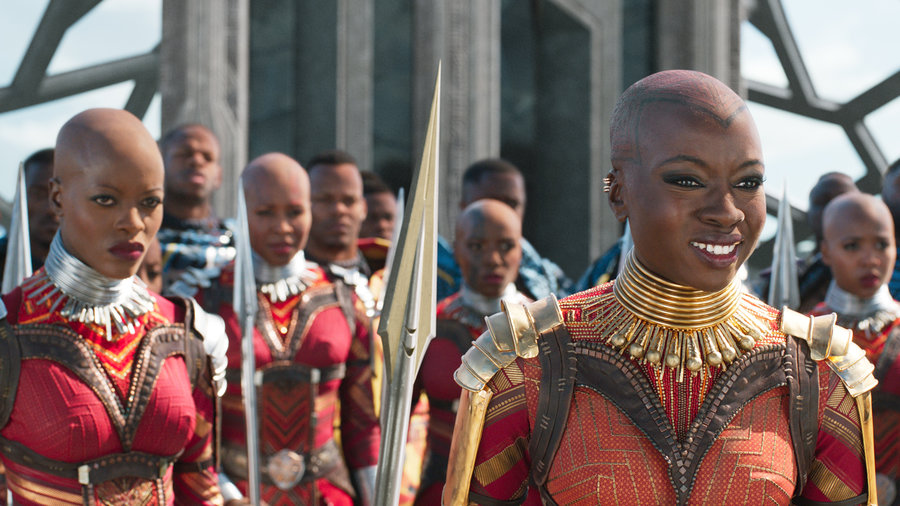But the playwright turned movie megastar is not actually taking a break from talking about the movie: She is sharing the film’s message with an audience that probably appreciates it more than any other will. “The thing I love about that film,” Gurira tells a group of wide-eyed teenagers at the African Leadership Academy in Johannesburg, is that it “shows that world where we think beyond whatever trauma we’ve experienced as a continent, and we reclaim ourselves and our greatness.”
Black Panther may be a box-office success, but it is all about the power of storytelling to inspire that act of reclamation. And so is Gurira, whose remarkable journey to stardom is the subject of this week’s episode of Breaking Big, airing at 8.30 p.m. ET Friday on PBS. “This continent is powerful and wealthy and has astounding potential,” Gurira, 40, informs the energized audience.
And it is a potential she has witnessed swelling — and diminishing — firsthand in recent decades. Gurira’s home nation of Zimbabwe was far from the real-life Wakanda of Africa during her early life there in the 1980s and ’90s, but the resource-rich southern African nation once represented the promise of that continent. Until, that is, it endured a social and economic free fall that set Gurira and millions of others adrift and on a long-term quest to reclaim their homeland’s greatness.
Zimbabwe’s longtime dictator, Robert Mugabe, once said that he would rule the southern African nation until “God says come.” Last November, however, it was not the hand of death but his own hand (following a military coup) that finally deposed the autocrat after 37 years of rule. Like another post-apartheid leader, Nelson Mandela, Mugabe was a political prisoner who helped liberate his people from white colonial rule. After Zimbabwe gained independence from Great Britain in 1980, he endorsed racial reconciliation and was even nominated for a Nobel Peace Prize.
At the time Zimbabwe held enormous promise: It had paved roads, airports and a strong education system, not to mention rich soil that helped make it the “breadbasket” of the continent. Mugabe himself recognized that he helmed the “jewel of Africa.” It was into this propitious atmosphere that 5-year-old Danai Gurira, born to Zimbabwean expats in rural Iowa, returned in 1983. Gurira tells OZY Editor-in-Chief Carlos Watson that she had an “idyllic childhood” in many respects. “Zimbabwe was in a very prosperous place,” she says, and she enjoyed a good education at an all-girls Catholic school in Harare. “Zimbabwe’s kind of known for being the nerd nation of the continent,” she quips.
Gurira, a self-described “Zamerican,” and her siblings performed plays in their backyard, and in the seventh grade she made her theatrical debut. Still, as a young person, the star of the hit television show The Walking Dead was more interested in being an activist than an actress. “I grew up in a home where I was allowed to assert my opinions and feel confident that they mattered,” she says — her high school friends even nicknamed her Megaphone. Gurira soon learned, though, that her voice was not valued so much outside of her family and friends. “I was in a society where women had less of a space to do that [speak out]. And I felt that incongruence very quickly, and it jarred me,” she says.
Meanwhile, Robert Mugabe was jarring an entire nation. The strongman began a brutal crackdown of political opponents and a violent program of seizing white-owned farms and redistributing them to his cronies. By 2008, a country that had enjoyed one of the highest economic growth rates in the world in the 1990s suffered from hyperinflation. Millions, including Gurira, who returned to the American Midwest to attend Macalester College in St. Paul, Minnesota, fled the country during that period.
Mugabe may be gone, but it will take years, maybe even decades, for Zimbabwe to reclaim its promise. And in that process of restoring a nation, and a continent, stories matter: The stories that African children see on their screens and stages — and that shape how they view their own potential — matter.
In addition to her work in film and television, Gurira has written several staged plays, including the Tony-nominated Eclipsed, which tells the story of five Liberian women caught in the middle of a civil war. Gurira says that she wants to continue to tell African women’s stories, and there are so many more stories to tell. It’s clear from the reception her words receive at the African Leadership Academy that she is not just a storyteller but a leader too.
So does the vocal expat still want to be an activist, or even a politician? “I’m not saying I wouldn’t,” she allows, “but, right now, I feel like I have to get these stories told. I’ve got these stories right here that need to get told.” – ozy.com




